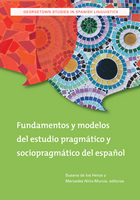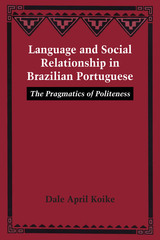
This rich textbook provides a comprehensive introduction to the principal concepts and thematic areas of Spanish pragmatics. It is aimed at advanced students of Spanish—upper-level undergraduates and beginning graduate students—who need to hone their language skills for contextually sensitive use of the language.
Written entirely in Spanish, with Spanish examples, this volume introduces basic pragmatics, methods of analysis, and new thematic areas such as language and the press and globalization. Theoretical explanations combine with practical exercises in each chapter to help students master the subtleties of language use.

"Give me the salt" and "Please pass the salt" make the same request, but in a polite situation the first utterance may give offense, while the second may not. How and why such differences in wording and intonation, in a particular context, produce different effects is the concern of pragmatics, the area of linguistics that deals with how speech is used in interaction. In this innovative study of pragmatics in Brazilian Portuguese, Dale Koike analyzes the politeness phenomenon, specifically in the context of speech acts known as "directives."
As acts intended to get someone to do something, directives bring into play a variety of sociocultural factors, depending on the relationship between the participants. Using empirical data obtained through natural language observation and from questionnaires of over one hundred adult native speakers, Koike identifies factors—such as age, education, and gender—that influence the strategies of politeness a given speaker is likely to use in making a directive. This research clarifies the unwritten language rules and assumptions that native speakers intuitively follow in phrasing their directive utterances.
Koike also includes important material on the acquisition of strategies for politeness by children and adult second-language learners, as well as on gender differences in politeness forms. Her research proposes important additions to the theory of speech acts as conceived by Austin and Searle, particularly in the application of deictic organization to account for a hierarchy of pragmatic forms.
Language and Social Relationship in Brazilian Portuguese will be of interest to a wide audience in diverse fields, including linguistics, anthropology, interaction analysis, communications, semantics, sociology, psychology, and education.

Spanish Second Language Acquisition provides a panoramic overview of previous studies on the acquisition of Spanish as a second or foreign language, the theoretical approaches used in these studies, and the effects of various pedagogical approaches on the development of Spanish interlanguage systems. Barbara Lafford and Rafael Salaberry have compiled the first volume to provide a comprehensive critical overview of the research done and data compiled on how adults acquire Spanish as a second language. Major scholars in the field of SLA have contributed chapters having to do with a wide range of "products" (phonology, tense/aspect, subjunctive, clitics, lexicon, discourse/pragmatics) and "processes" (generative, cognitive and sociocultural theories) involved in the acquisition process-concluding with a discussion of the effects of instruction on Spanish interlanguage development.
While being an invaluable reference tool for undergraduate and graduate programs that focus on the acquisition of Spanish as a second language, due to the extraordinary range of the review research on theoretical and methodological issues, this is also an extremely useful volume for second language theoreticians and practitioners involved in all aspects of the pedagogy of other second languages. It is the editors' desire that students, teachers, program administrators and scholars alike will benefit from the insights that the contributors bring to the myriad issues that language professionals confront.
READERS
Browse our collection.
PUBLISHERS
See BiblioVault's publisher services.
STUDENT SERVICES
Files for college accessibility offices.
UChicago Accessibility Resources
home | accessibility | search | about | contact us
BiblioVault ® 2001 - 2024
The University of Chicago Press









